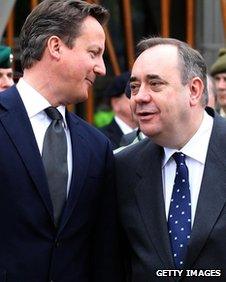Taking the initiative on the independence question
- Published

How far off will the independence referendum be?
So where were we? On the verge of an independence referendum in Scotland? And has that verge narrowed or widened as a result of developments over the weekend and today?
For any sake, where are my manners? A guid New Year to all regular and new readers of this blog. May 2012 bring prosperity, good times and a Dundee United cup victory.
Now then. The referendum. David Cameron has now indicated that he wants to intervene in the issue in order, he argues, to facilitate the holding of such a plebiscite on a fair and legal basis.
And has this kind offer been greeted with cries of delight in St Andrews House? It has not. Rather, Alex Salmond says it is an unwarranted interference in his government's own programme.
So what is going on? Firstly, a point re the coalition. One senses, to some extent, the leading edge in that partnership, the Conservatives, seeking to seize the initiative.
That perhaps explains why the indications are initially coming from Downing Street and the Prime Minister rather than, directly or indirectly at this stage, from Dover House and the Liberal Democrat Secretary of State.
Reserved issue
I genuinely would not want to read too much into this. Michael Moore is similarly keen to address this issue and his civil servants have been labouring mightily on the topic for months.
Nonetheless, this has the stamp of a Downing Street initiative while, of course, the details and the implementation will be handled by the Scotland Office.

David Cameron and Alex Salmond at Holyrood
Secondly, it would appear evident that the UK Government is seeking to counter the tendency for Alex Salmond to make all the running on the issue of the constitution and independence.
While constantly averring that the question of independence is a matter for the Scots, Mr Cameron is saying, in essence, that the nature of that question and the fashion in which it is put are matters for the UK Government as well - not least because the constitution is a reserved issue and the outcome would affect the wider UK.
So what has happened? The UK Government has concluded and will announce this week that the referendum cannot, legally, be held by the Scottish Government as things stand on the grounds, as billed above, that the constitution is reserved in the 1998 Act which established the Scottish Parliament.
They will offer to resolve that dilemma in the interests of holding what Mr Cameron calls a "legal, fair and decisive" plebiscite.
But with strings. There must be but a single question - independence yes or no. The referendum must be properly run - which probably means the Electoral Commission in charge. And it must be held expeditiously - which means possibly within 18 months, ahead of Mr Salmond's preferred timetable.
Let us be very clear that the Scottish Government does not accept the premise upon which this entire edifice is constructed.
Reject the initiative
Alex Salmond and his ministers are adamant that they have the power to hold a consultative referendum: one which would mandate them to open negotiations with the UK Government over eventual Scottish independence. That means that they reject the initiative from the UK Government.
So what is on offer? UK ministers have identified three broad options. To legislate to enable the Scottish Parliament to hold a referendum. For the UK Government to call the referendum themselves. Thirdly, to do nothing, leaving the issue to be determined following a possible legal challenge to the Scottish Government's plans by an aggrieved citizen.
UK ministers say option three would be to dodge their responsibilities to ensure a fair and decisive outcome. It would be neglecting duty.
Option Two? UK ministers do not fancy that one. Why? They will say this is primarily a matter for the Scottish Government - but the strategic reason is that UK ministers fear such a Westminster-instigated poll, held by a Conservative-led government against the wishes of the elected Scottish Parliament, might be a virtual invitation to Scots to support an end to the Union.
Which leaves Option One. Legislate to give the Scottish Government and Parliament the specific power to hold such a referendum (remembering always that the SG does not accept that a problem arises.)
The UKG could act in two ways. They could table a Section 30 Order under the terms of the original 1998 Scotland Act. This has been used in the past to enhance the powers of Holyrood, for example to run railways in Scotland.
Snag? Such an order would be processed at Westminster - but requires the explicit consent of Holyrood before if proceeds. As things stand, consent would not be forthcoming from the SNP majority at Holyrood.
So an alternative is to amend the Scotland Bill presently before Westminster which is designed to alter Holyrood's power basket, including over taxation.
But does that also require Holyrood consent? That is certainly the belief at Holyrood - and the Scottish Secretary has said that the bill would not carry without consent in Edinburgh. Others in the UKG say that is simply a convention - and could be overturned.
However, that degree of uncertainty - and the wider issue of whether this is all seen as unwarranted interference - combine to mean that today's initiative should be seen as a negotiation rather than an initiative which is without challenge.
'Not there yet'
In essence, Mr Cameron is saying to Mr Salmond. You can have your referendum - but we will only make it easier for you if you agree to our terms: single question, Electoral Commission, shorter time scale.
To stress again, Mr Salmond rejects the premise. He counters the diagnosis and hence rejects the cure.
But might there be room for negotiation? Is it just conceivable that Mr Salmond might get his date of 2014 if he concedes the other points - a single question and run by the Electoral Commission.
Maybe. But we are not there yet.
Not by a long way. Indeed, we are still at the stage of rhetoric rather than action with each side imputing wicked motives to the other.